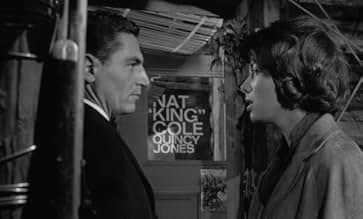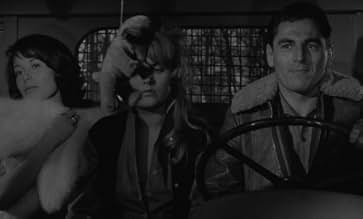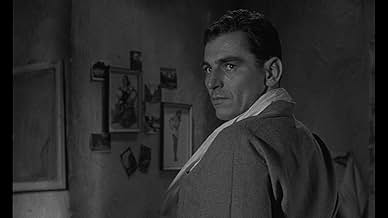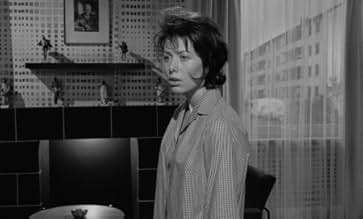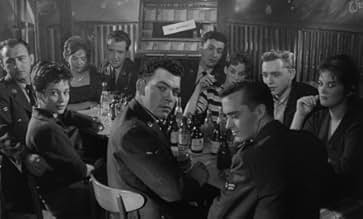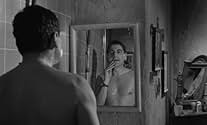Die Geschichte spielt im Nachkriegsdeutschland, nach der Niederlage Deutschlands im Zweiten Weltkrieg. Jahrelang kämpften die Menschen mit einem Mangel an allem, an Wohnraum, Wasser, Nahrung... Alles lesenDie Geschichte spielt im Nachkriegsdeutschland, nach der Niederlage Deutschlands im Zweiten Weltkrieg. Jahrelang kämpften die Menschen mit einem Mangel an allem, an Wohnraum, Wasser, Nahrung, Kleidung.Die Geschichte spielt im Nachkriegsdeutschland, nach der Niederlage Deutschlands im Zweiten Weltkrieg. Jahrelang kämpften die Menschen mit einem Mangel an allem, an Wohnraum, Wasser, Nahrung, Kleidung.
- Regie
- Drehbuch
- Hauptbesetzung
Empfohlene Bewertungen
"Schwarzer Kies" is an extremely bleak movie that makes me wonder it ever found enough supporters to get made at all. The dark, disturbing story is portrays a German village living off an American Air Force Base (around 1960) mostly by cheating and prostituting. It is not surprising that the film didn't do much money at the box office. And the film was hurt by an accusation of antisemitism, which led to being recut to avoid a bad press. The accusation was a clear misinterpretation. What the film really did, was to show that antisemitism was still around and some people had not changed.
The Americans (all played by German actors) do not appear much better than the Germans. Their plan to build a rocket launch base does not sound very promising for peace. The soldiers are shown mainly frequenting a local bar/bordello and the officers checking bills and hoping to leave soon for a better post. Director Helmut Käutner did not spare many, most people in his film are in some way cunning, every one seems to be involved or at least in the know of the black market around the base. From the very first scene to the very last, the film is most uncompromising in his portrait of greed, lust and bondage.
The actors are all unknown today although they did a good job. It is a Germany we have never seen on film before or even after. It took guts to get this film made. The Friedrich Wilhem Murnau Stiftung did a great job restoring the film to its original lenght and optical quality.
The Americans (all played by German actors) do not appear much better than the Germans. Their plan to build a rocket launch base does not sound very promising for peace. The soldiers are shown mainly frequenting a local bar/bordello and the officers checking bills and hoping to leave soon for a better post. Director Helmut Käutner did not spare many, most people in his film are in some way cunning, every one seems to be involved or at least in the know of the black market around the base. From the very first scene to the very last, the film is most uncompromising in his portrait of greed, lust and bondage.
The actors are all unknown today although they did a good job. It is a Germany we have never seen on film before or even after. It took guts to get this film made. The Friedrich Wilhem Murnau Stiftung did a great job restoring the film to its original lenght and optical quality.
(1961) Black Gravel/ Schwarzer Kies
(In German with English subtitles)
CRIME DRAMA
Co-written and directed by Helmut Käutner that has gravel dump truck driver, Robert Neidhardt taking advantage of a situation slipping out and stealing some gravel after a dog had been killed. But before he throws the lifeless dog to be buried by the gravel itself, he would then steal it's collar while the crowd are paying attention to the fight between one of the workers and the soldiers. And while driving along the empty gravel road, he would then notice a major, John Gaines (Hans Cossy) and his wife stranded in the middle of the road and he decides to stop. And it was not until he stepped into the major's car Robert sees someone he recognizes, and she happened to be an old flame, Inge Gaines (Ingmar Zeisberg). And for the price of 10 dollars during Robert was towing the major's car back to the base of Sohnen, the rope breaks out, and they both agree Inge would ride with Robert back into town and call for a toll truck/ mechanic. And during their conversation, she then informs him she is looking for her dog to which it just happens to be the same one that was killed at the opening. Except that he has plans to use the dog's collar as a ruse to meeting her again as they had a history together before she met her current husband as he has a girlfriend, Elli (Anita Höfer) he does not care too much about. Robert is also friends with Sgt Bill Rodgers (Peter Nestler) and his girlfriend Anni Peel (Edeltraut Elsner) are going to cross paths again under unfortunate circumstances with a guy named Eric Moeller (Heinrich Trimbur). And another guy, Otto Krahne (Wolfgang Büttner) who was a part of his racket but has decided to move to Canada.
While watching this reminded me of another movie called "Night and the City" starring Richard Widmark when the center person, Robert gets himself into trouble and digs himself into a bigger hole.
For a movie such as this I think I prefer the much more ambiguous ending that was intended than the one the director had intended if according to Eddie Mueller is correct. The gravel itself could have been symbolic and metaphor since viewers are not clear where a particular two people had been buried other than the dog.
Co-written and directed by Helmut Käutner that has gravel dump truck driver, Robert Neidhardt taking advantage of a situation slipping out and stealing some gravel after a dog had been killed. But before he throws the lifeless dog to be buried by the gravel itself, he would then steal it's collar while the crowd are paying attention to the fight between one of the workers and the soldiers. And while driving along the empty gravel road, he would then notice a major, John Gaines (Hans Cossy) and his wife stranded in the middle of the road and he decides to stop. And it was not until he stepped into the major's car Robert sees someone he recognizes, and she happened to be an old flame, Inge Gaines (Ingmar Zeisberg). And for the price of 10 dollars during Robert was towing the major's car back to the base of Sohnen, the rope breaks out, and they both agree Inge would ride with Robert back into town and call for a toll truck/ mechanic. And during their conversation, she then informs him she is looking for her dog to which it just happens to be the same one that was killed at the opening. Except that he has plans to use the dog's collar as a ruse to meeting her again as they had a history together before she met her current husband as he has a girlfriend, Elli (Anita Höfer) he does not care too much about. Robert is also friends with Sgt Bill Rodgers (Peter Nestler) and his girlfriend Anni Peel (Edeltraut Elsner) are going to cross paths again under unfortunate circumstances with a guy named Eric Moeller (Heinrich Trimbur). And another guy, Otto Krahne (Wolfgang Büttner) who was a part of his racket but has decided to move to Canada.
While watching this reminded me of another movie called "Night and the City" starring Richard Widmark when the center person, Robert gets himself into trouble and digs himself into a bigger hole.
For a movie such as this I think I prefer the much more ambiguous ending that was intended than the one the director had intended if according to Eddie Mueller is correct. The gravel itself could have been symbolic and metaphor since viewers are not clear where a particular two people had been buried other than the dog.
While I disagree with Eddie Muller's opinion, voiced on TCM's Noir Alley, that this 1961 German film is a masterpiece...the American characters, played by Germans, are too stiff/caricatured, for one thing, and the key scene where Bill/Anni are killed is badly edited, for another...I do think it's a very good late era noir. It does what all fine entries in this darkest of genres must do, namely create a believable moral hellscape. In this case it is West Germany in the uneasy period when WW2 was still very much alive in the hearts/minds of the defeated Germans and relations with the victors is fraught, to say the least. The key visual symbols of this tense, fearful and more than occasionally violent mood are the gravel pit/burial ground and the divey bar/brothel where ceremonies of moral corruption, from stealing to anti Semitism to murder, are enacted. And through these images the tawdry, bleak, lost atmosphere is powerfully conveyed by director Helmut Kautner. Indeed, too powerfully for the German censors of the time who preferred a more "uplifting" vision of their country in the Kennedy 60s (think Elvis in "GI Blues") and thus falsely accused the film of hostility toward Jews (it is, actually, quite the opposite) and ostracized Kautner from film making . Hard to feel too sorry for the guy who, after all, worked steadily in Germany under the Nazis, but certainly not difficult to feel exasperation at the willful misunderstanding from the cultural establishment. B plus.
A 1961 German film which was presented on Noir Alley which qualifies for being a neo-noir. It's post war Germany & the residents are trying to make ends meet while under the scrutiny of the American armed forces still stationed there. Our anti-hero, Helmut Wildt, is met making his rounds driving a truck which carries the occasional black market item but one day he runs into a military man & his wife, Ingmar Zeisberg, stranded by the side of the road & offers them a ride into town for help. He recognizes Zeisberg as an old flame & they reunite awkwardly but her new life & his current one is at odds w/them actually making any headway. They do eventually hook up & one night while they're driving in his truck unbeknownst to them a pair of lovers, who Wildt knows, end up being run over by his truck which prompts Wildt to take care of the situation while he tries to keep Zeisberg out of it. What follows is chapter & verse of what we've come to expect from noir but here done exceedingly well w/Wildt being championed by the audience, no matter how rotten he seems, to succeed but we know that's not the case even though according to host Eddie Muller even German audiences felt the ending was too bleak for them which says a lot.
This is rather terrific and very different something like a noir, but certainly very dark and nasty with some surprisingly, sudden moments of nudity. Set in Sohnen, a fictional village, in Hunstrueck near by a US airbase using to train jet pilots although here we do not see these but instead we have the black market and this amazing bar and brothel. There is death from the very beginning and some more but none of those sexy kills and there is something worrying amidst the rubble and muddy sites while overhead the whine of those jets. In that bar there is fun and sex and music from the jukebox but dark outside there is death and passion and nothing sentimental at all. The location shooting was done at the Hahn Air Base and the interiors in Berlin. Helmut Kautner filmed throughout the war but after this one there were clearly problems and even making some cuts it disappeared and afterwards he moved into TV.
Wusstest du schon
- WissenswertesFirst German film shown on TCM's "Noir Alley" on 14 December 2024.
- PatzerAnni and Bill invite Bob into the back of their car to get out of the rain. BUT once in the car Bob's hair and jacket collar are dry, even though the rainfall on the rear window is quite obviously quite significant.
- Alternative VersionenShortly after its general release, the film was changed from its premiere cut. Due to complaints by the Central Council of Jews in Germany, two scenes were shortened in which a character is revealed to be a Holocaust survivor and an antisemitic slur is used against him. The ending was also changed and is much less dark: in the shortened cut, both Inge and Robert survive. The premiere cut was restored during the film's digital restoration in 2016.
Top-Auswahl
Melde dich zum Bewerten an und greife auf die Watchlist für personalisierte Empfehlungen zu.
Details
- Laufzeit1 Stunde 53 Minuten
- Farbe
- Sound-Mix
- Seitenverhältnis
- 1.66 : 1
Zu dieser Seite beitragen
Bearbeitung vorschlagen oder fehlenden Inhalt hinzufügen


